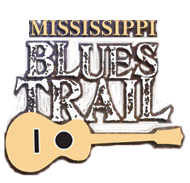Little Brother Montgomery
Little Brother Montgomery - Brookhaven
Little Brother Montgomery (1906-1985), a major presence on south Mississippi’s blues and jazz scene during much of the pre-World War II era, was famed for his trembling vocals and masterful piano playing. The Montgomery family, including his brothers Joe and Tollie, also pianists, once lived in Norfield, a sawmill town thirteen miles south of Brookhaven. Montgomery was popular at sawmills and lumber camps, and played cafes and dances in Vicksburg, Jackson, Brookhaven, McComb, and other towns.
Little Brother Montgomery is often associated with his native Kentwood, Louisiana, or with Chicago, where he spent the majority of his long career, but he was also once the most prominent blues pianist in Mississippi. He inspired a young Willie Dixon in Vicksburg, mentored Otis Spann and Little Johnnie Jones in Jackson, and influenced Skip James, Arthur “Big Boy” Crudup, Sunnyland Slim, and many others. Born Eurreal Wilford Montgomery on April 18, 1906 (or possibly a year or two later according to some documents), he took to piano as a child. His parents and siblings all played music and his father, Harper Montgomery, ran a juke joint where pianists entertained local lumber workers. Montgomery said he left home at age eleven to play piano on the road, but he continued to use the family home as a base during his travels. In the 1920s the family relocated to Norfield, where Harper Montgomery worked for the Denkmann Lumber Company. His daughter Aris, whose son Paul Gayten became a renowned New Orleans pianist and producer, also moved with her husband to Norfield. Sawmills often stayed in a location only until the surrounding timber supply was exhausted, then moved to a forested area to resume operations. In 1931 Denkmann abandoned Norfield and reassembled its machinery in Canton; the Montgomerys and many other workers’ families followed.
Sawmill communities and lumber, turpentine, and levee camps provided employment for many blues musicians, including Little Brother Montgomery. But he also performed at nightspots during stays in Vicksburg, Canton, Gulfport, and New Orleans, traveled with dance bands, and tried living in Chicago for a few years. Montgomery recorded his signature tune, “Vicksburg Blues,” in 1930. Returning to Mississippi in 1931, he led his own Jackson-based Southland Troubadors, sometimes broadcasting on local stations such as WCOC in Meridian, to advertise the band’s appearances. The group, which also toured several states billed as the Collegiate Ramblers, never recorded, but as a solo pianist or with only one accompanist, Montgomery cut twenty-two blues sides, all released on singles on the Bluebird label, in 1935-36.
Montgomery, hailed in Down Beat magazine in 1940 as “the greatest piano man that ever invaded Dixie,” spent time in Yazoo City, Hattiesburg, and Beaumont, Texas, before permanently settling in Chicago in 1942. There, as in Mississippi, he became a respected figure, dividing his time between performing with bands and as a solo blues artist. He was a key participant in the city’s traditional jazz scene as well as a standard-bearer of blues piano. Montgomery accompanied Memphis Minnie, Otis Rush, Magic Sam, Buddy Guy, and others on recording sessions as well as cutting numerous albums of his own in the U.S., Europe, and Japan until his death on September 6, 1985.
content © Mississippi Blues Commission
[ BACK TO TOP ]

